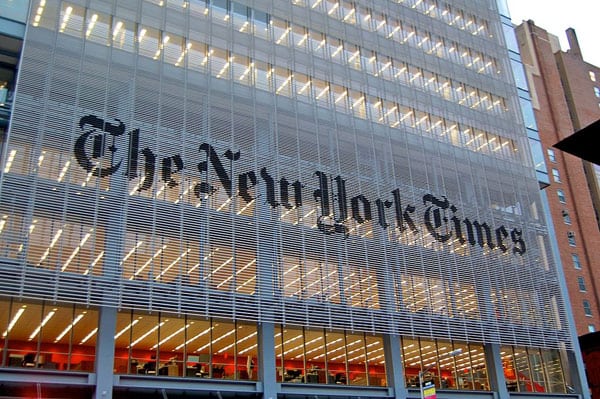
July 29, 2018; New York Times
A.G. Sulzberger, publisher of The New York Times, received a request from the White House to meet with President Trump off the record. This was not an unusual invitation, as major newspaper publishers traditionally hold such meetings with presidents. The meeting took place on July 20th at the White House. James Bennet, the Times’ editorial page editor, accompanied Sulzberger, but executive editor Dean Baquet skipped the meeting on principle: “As a rule I don’t go off the record with high-ranking officials, particularly the president.”
Had a very good and interesting meeting at the White House with A.G. Sulzberger, Publisher of the New York Times. Spent much time talking about the vast amounts of Fake News being put out by the media & how that Fake News has morphed into phrase, “Enemy of the People.” Sad!
— Donald J. Trump (@realDonaldTrump) July 29, 2018
Trump tweeted from his golf club in Bedminster, N.J., on Sunday morning describing the meeting with Sulzberger and Bennet as “very good and interesting.” But in using the phrase “enemy of the people,” Trump did not admit he was the one who first used that alarming phrase in his first year in office and continues to use the label to assail the news media. Now that the meeting was suddenly on the record, Sulzberger responded to correct the record, and a public battle ensued as the president and the paper traded Twitter fire.
Sulzberger warned Trump in their meeting that his inflammatory language leads to violence against journalists. Trump later tweeted, “When the media—driven insane by their Trump Derangement Syndrome—reveals internal deliberations of our government, it truly puts the lives of many, not just journalists, at risk! Very unpatriotic!”
Sign up for our free newsletters
Subscribe to NPQ's newsletters to have our top stories delivered directly to your inbox.
By signing up, you agree to our privacy policy and terms of use, and to receive messages from NPQ and our partners.
Mr. Sulzberger recalled telling Mr. Trump at one point that newspapers had begun posting armed guards outside their offices because of a rise in threats against journalists. The president, he said, expressed surprise that they did not already have armed guards.
At another point, Mr. Trump expressed pride in popularizing the phrase “fake news,” and said other countries had begun banning it. Mr. Sulzberger responded that those countries were dictatorships and that they were not banning “fake news” but rather independent scrutiny of their actions.
As a recent poll indicates, Trump supporters will likely believe that he successfully defended his administration against “fake news” by the “Failing New York Times” (they are in fact doing just fine). But Sulzberger’s point is indisputable that when the US president labels journalists as “enemies of the people,” it provides license for dictators, despots, and purveyors of mob rule to threaten the press as a means to silence critics and evade accountability.
The European Centre for Press and Media Freedom in Germany (ECPMF) sees parallels to this dangerous rhetoric against the news media in the US to the significant increase in violence against German reporters in 2015 and 2016.
“By calling journalists ‘enemy of the people,’ President Donald Trump declares war on them and legitimizes any attack on journalists,” the ECPMF wrote in a statement to The Post on Monday. “The [findings of the research] were crystal clear: When constantly slandered as ‘lying press,’ journalists are in danger.”
Journalists around the world face hostility from local and federal governments, along with a number of legal threats to themselves and their sources. The Committee to Protect Journalists issued this Safety Advisory to journalists traveling to Russia to cover the World Cup. In addition to the CPJ, the US Press Freedom Tracker, Reporters Without Borders, and others report on incidents of violence and threats made against journalists. Country-specific advocacy groups such as the Foundation for Press Freedom in Colombia recently reported that “124 journalists have been threatened in more than 100 death threats so far this year, a 48 percent increase compared to the same period last year.”
Even in the best of circumstances, journalism requires many personal sacrifices, pays little money, and holds a Constitutional mandate to search for the truth and inform the public. In the face of the rising swell of resentment against journalists, it remains one of the noblest professions, no matter who inveighs against it.—Jim Schaffer












